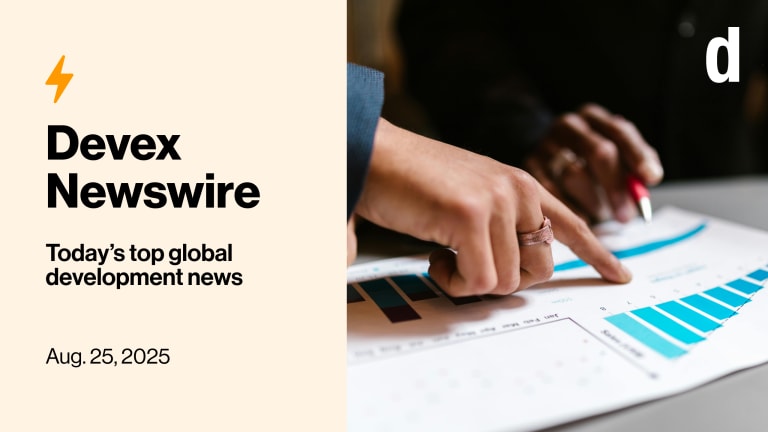
If your New Year's resolution is to finally wrap your head around cryptocurrency and whether it can somehow help your organization raise money, you are not alone.
This is a preview of Newswire
Sign up to this newsletter for an inside look at the biggest stories in global development, in your inbox daily.
Cryptocurrency philanthropy is accelerating at an “extreme” rate, my colleague Stephanie Beasley reports. A few examples:
• The Giving Block, a popular crypto donation platform, expects to see its crypto fundraising grow from about $100 million in 2021 to $1 billion in 2022. It’s also launched a new “premium cryptocurrency donation experience” aimed at high net worth individuals.
• GiveDirectly, which provides cash transfer services to people living in poverty, saw the number of people giving in cryptocurrency increase by 60 times between 2020 and 2021.
• Jack Dorsey, co-founder of Twitter, raised $2.9 million from the sale of the first published tweet as a non-fungible token — NFT — and donated the proceeds to GiveDirectly Africa fund in March.
• Vitalik Buterin, a co-founder of blockchain technology company Ethereum, upped the ante by donating $1.2 billion worth of tokens to India’s Crypto Covid Relief Fund in May.
• Peter Singer, the patron saint of effective altruism, announced a plan to auction his seminal 1971 paper, “Famine, Affluence and Morality,” and other items as NFTs and donate the proceeds to the charity assessment organization he co-founded — though he’s taken heat for that announcement.
For development organizations, jumping into the crypto fundraising fray comes with costs and benefits — volatility on one hand, flexibility on another, not to mention overarching questions about ethics, regulations, and environmental impacts.
Read: Will 2022 be a boom year for cryptocurrency philanthropy?
As the number of crypto billionaires climbs, so too will their giving — along with the number of nonprofits that accept these digital assets. Early adopters share how they are navigating this new frontier.
+ We have a beginner's guide to cryptocurrency for our Devex Pro subscribers.
If you build it, they still won’t come
“The result was a radically different system of education, based upon a new mindset. That new system not only scaled but proved more successful than the earlier method.”
— Safiqul Islam, former education program director, BRACIn the early 1980s, 40% of Bangladesh’s primary-school-age children were not in school, half of those who enrolled dropped out, and only 30% went on to complete their primary education. Islam, who directed BRAC’s education program for 34 years, writes that the organization set out to find out why — and to question all of the assumptions underlying the country’s education system.
For starters, why was Bangladesh so focused on building schools?
Opinion: There's a better way to reach millions of unschooled children
Ups and downs
A few weeks ago my colleagues reported that internationally focused NGOs have seen big increases in U.S. public giving, which many of them attribute to changes in perspective brought about by the COVID-19 pandemic.
But there’s a catch.
David Ainsworth reports that one of the world’s largest health NGOs, the Task Force for Global Health, has taken a billion-dollar hit over the last couple of years. One big reason? The organization gets most of its support through in-kind donations, and the pandemic has made it much more difficult to deliver goods around the world.
Devex Pro: Why one major NGO saw support fall by $1.6B
Dismal science
Adnan Qadir Khan, currently a professor at the London School of Economics, is the new Foreign, Commonwealth & Development Office chief economist. He is taking over the role from Rachel Glennester.
Khan was born in Pakistan, where his early work was focused before he took on a series of international positions. Both he and Glennerster have been affiliates of the Abdul Latif Jameel Poverty Action Lab at the Massachusetts Institute of Technology.
Khan joins FCDO at a critical time, as the department begins to stabilize after its unsettled first year, and prepares to publish its long-awaited international development strategy.
Read: FCDO appoints new chief economist
+ Pro subscribers can review how the fledgling FCDO performed in its first year and track its commercial pipeline, which has 49 opportunities worth £948.4 million ($1.25 billion) for bidders.
Top 5
If you’re not already aware, Devex Pro is our subscription that offers deeper analysis and exclusive opportunities to connect with our journalism. In 2021, Devex reporters dug into Oxfam’s challenging reform process, followed the COVID-19 money, and scrutinized the hype over Omaze, the charitable fundraiser that entices donors with dream prize giveaways.
Check out all of the top Pro stories of 2021.
And if you haven’t yet, sign up for Pro today and start your 15-day free trial.
In other news
Airstrikes in Ethiopia’s northern Tigray region have killed 143 people and injured 213 since October, according to aid agencies. [Bloomberg]
The release of the International Monetary Fund’s World Economic Outlook for 2022 will be delayed to Jan. 25 to allow COVID-19 developments to be incorporated into the report. [Reuters]
At least eight have died following heavy rains that caused flash flooding in Iran, where the Red Crescent is providing relief assistance to some 20,000 people. [Al Jazeera]
Sign up to Newswire for an inside look at the biggest stories in global development.




